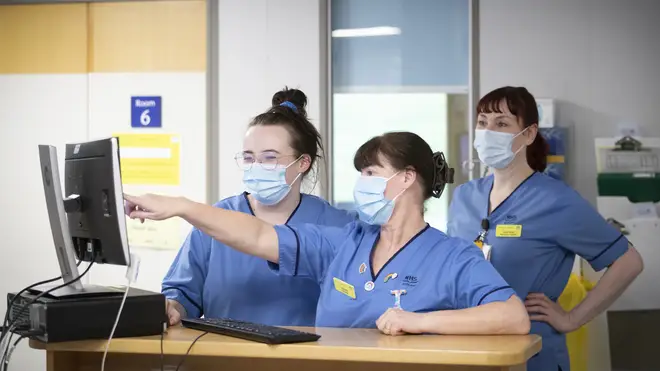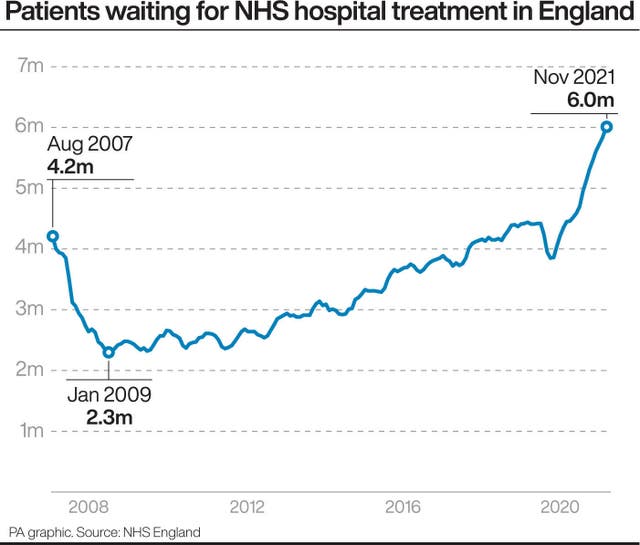
Henry Riley 4am - 7am
24 January 2022, 00:04

A ‘decent’ pay rise is needed to help halt the ‘growing exodus of exhausted staff’ from the NHS, ministers have been warned.
Health unions are calling for an “inflation-busting” pay rise to tackle the NHS staffing crisis and increasing waiting times for treatment.
In evidence to the independent NHS pay review body, 14 unions representing 1.2 million health staff in England, urged the Government to take action on pay, otherwise they warned that the “growing exodus of exhausted staff” from the NHS will continue.
The unions, representing staff including nurses, midwives, porters and ambulance crews, warned that without a decent pay rise this year, the NHS will continue to lose staff at “alarming” rates.
The Government clashed with unions last year over NHS pay amid the huge strain on the service because of the virus crisis, eventually awarding a 3% rise in England.
The submission calls on the Government to make sure this year’s pay rise cushions health workers from increased living costs and helps the NHS to retain and attract staff.
Union officials said the the huge number of Omicron-related work absences among health workers in recent weeks, coupled with 93,000 vacancies in England, has shown that the NHS is “fragile.”
The submission warns that large numbers of staff have “had enough”, with many actively seeking alternative employment.
The unions call for an inflation-proofed pay rise, the earnings of the lowest paid workers to be boosted above real living wage rates, and limits on excessive hours to prevent burnout.

Unison’s head of health Sara Gorton said: “Last year Government dithering caused health workers to wait months for a measly pay rise. Ministers mustn’t make the same mistake again.
“An above-inflation increase alone isn’t a magic solution to the NHS’s many problems, but a decent wage boost could be just the trick to persuade many burnt-out staff to stay.
“Time is now of the essence. The Government needs to pull its finger out and show it’s prepared to act quickly to hold on to experienced health workers, protect the NHS and cut waiting times.
“If direct pay talks with Government can deliver a speedier pay outcome, then unions could get around the negotiating table instantly.”
Royal College of Nursing director of employment relations and legal services Joanne Galbraith-Marten said: “Ministers repeatedly inflicted real-terms pay cuts on NHS staff and, this year, the spiralling cost of living puts them under even greater strain.
“Exhausted and demoralised staff need to know the Government is on their side – not to hear that it is stalling again on NHS pay.
“To prevent an exodus from the health service, with untold consequences for patients, ministers must quickly rise to the challenge.”
Royal College of Midwives executive director for external affairs Jon Skewes said: “It’s high time the Government gave our NHS workers the respect they deserve. Let’s hope they don’t fail to meet their own deadline again today, as this will further erode the little morale that’s left among NHS staff.
“Every part of the NHS is severely suffering with recruitment and retention issues. Staff are leaving in their droves. They’ve had enough and a fair and decent pay rise may well prevent those who are considering leaving to stay.”
The 14 NHS unions are the British Association of Occupational Therapists, British Dietetic Association, British Orthoptic Society, Chartered Society of Physiotherapy, Royal College of Podiatry, Federation of Clinical Scientists, GMB, Managers in Partnership, Prison Officers Association, Royal College of Midwives, Royal College of Nursing, Society of Radiographers, Unison and Unite.
A Department of Health and Social Care spokesperson said: “NHS staff, from doctors and nurses to paramedics and porters, have rightly received a 3% pay rise this year, which has increased nurses’ pay by £1,000 on average.
“We have provided record investment for the health service and are committed to reducing vacancy numbers and growing the workforce, with 50,000 more nurses by the end of this Parliament.
“We will consider the pay review bodies reports carefully when we receive them.”